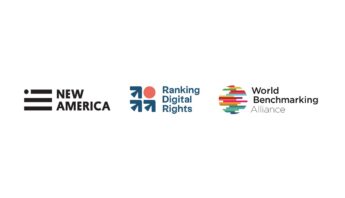In 2019-2020, we worked to expand and revise our methodology to include new issue areas and new company types. This work has focused on three main areas:
- Improving 2019 RDR Index methodology: This has involved reviewing the 2019 RDR Index methodology to identify key areas for revision and improvement.
- Incorporating new indicators on targeted advertising and algorithms: We developed new indicators that set global accountability and transparency standards for how companies can demonstrate respect for human rights online as they develop and deploy these new technologies.
- Incorporating new companies: We conducted research and public consultation on ways to expand the RDR Index to include Amazon and Alibaba. This process laid the groundwork for incorporating two new services—e-commerce platforms and “personal digital assistant ecosystems”—into the 2020 RDR Index methodology.
For an in-depth summary of our revisions, click here [PDF].
Methodology development, 2019-2020
Winter/Spring 2019: RDR research staff conducted extensive internal research and gathered feedback from more than 90 expert stakeholders.
February 2019: RDR published a set of public consultation documents that synthesize RDR’s approach to targeted advertising and human rights.
July 2019: RDR published a set of public consultation documents that synthesize RDR’s approach to algorithmic decision-making systems and human rights.
October 2019: RDR published draft indicators on targeted advertising and algorithmic systems.
Fall/Winter 2020: Draft indicators were pilot-tested by the RDR research team.
March 2020: The results of the pilot study were published.
April 2020: RDR published a draft version of the 2020 RDR Index methodology, which integrated work across these three areas. We then opened a final round of public consultation to solicit key feedback from stakeholders, which informed decisions we made as we finalized the methodology.
June 2020: RDR published the final version of the 2020 RDR Index methodology.
The results of the 2020 RDR Index will be published in February 2021.
Our goal in developing indicators that address targeted advertising is to set global accountability and transparency standards for how major, publicly traded internet, mobile, and telecommunications companies that profit from targeted advertising can demonstrate respect for human rights online.
In February 2019, we published a set of public consultation documents that synthesize RDR’s approach to targeted advertising and human rights:
a. Rationale for RDR’s methodology expansion to address targeted advertising: an overview of why and how the RDR research team is approaching the indicator development process.
b. Human Rights Risk Scenarios: a list of “risk scenarios,” each describing human rights harms directly or indirectly related to privacy and expression that can result from targeted advertising business models and the choices they incentivize companies to make.
c. Best Practices: a number of best practices for company disclosure and policy that could help prevent or mitigate these risks.
Stakeholder consultations: Between February and June 2019, we convened a series of stakeholder consultations (in person in various locations and via conference call) where we solicited input on our targeted advertising research from experts in civil society, companies, and government.
Our goal in developing indicators that address algorithmic decision-making systems is to set global accountability and transparency standards for how major, publicly traded internet, mobile, and telecommunications companies that use these technologies can demonstrate respect for freedom of expression and information, privacy, and other human rights online.
In July 2019, we published a set of public consultation documents that synthesize RDR’s approach to algorithmic decision-making systems and human rights:
a. Rationale for RDR’s methodology expansion to address algorithms, machine learning, and automated decision-making: an overview of why and how RDR is expanding the RDR Index to include new indicators that set benchmarks for best practices around the use of algorithms, machine learning, and automated decision-making.
b. Human rights risk scenarios: a list of “risk scenarios,” each describing human rights harms directly or indirectly related to privacy and expression that can result from the use of algorithms, machine learning and automated decision-making.
c. Best practices: a number of best practices for company disclosure and policy that could help prevent or mitigate these risks.
New companies: Amazon and Alibaba
RDR Index methodology has long focused on major, publicly traded internet, mobile, and telecommunications companies. But as the technology industry continues to evolve, the RDR Index must keep pace with emerging threats to human rights online by adding new company types, including powerful global platforms with core e-commerce businesses. In early 2019, we began the process of research and public consultation on ways to expand the RDR Index to include Amazon and Alibaba, two of the world’s largest e-commerce companies.
In July 2019, we published a set of public consultation documents that synthesize RDR’s approach to incorporating e-commerce businesses Amazon and Alibaba into the RDR Index.
a. Rationale for RDR’s methodology expansion to include Amazon and Alibaba: an overview of why and how the RDR research team is approaching the addition to the RDR Index.
b. Human rights risk scenarios: a list of “risk scenarios,” each describing human rights harms directly or indirectly related to privacy and expression that can result from e-commerce businesses.
c. Best practices: a number of best practices for company disclosure and policy that could help prevent or mitigate these risks.
Review of the current methodology
As part of our ongoing methodology development work, we also reviewed the 2019 RDR Index methodology to update those standards in light of new technologies and other trends.
Curious to learn about future updates? The best way to keep up with our progress and plans is to subscribe to our newsletter here.
[Last updated: 8 June 2020]



